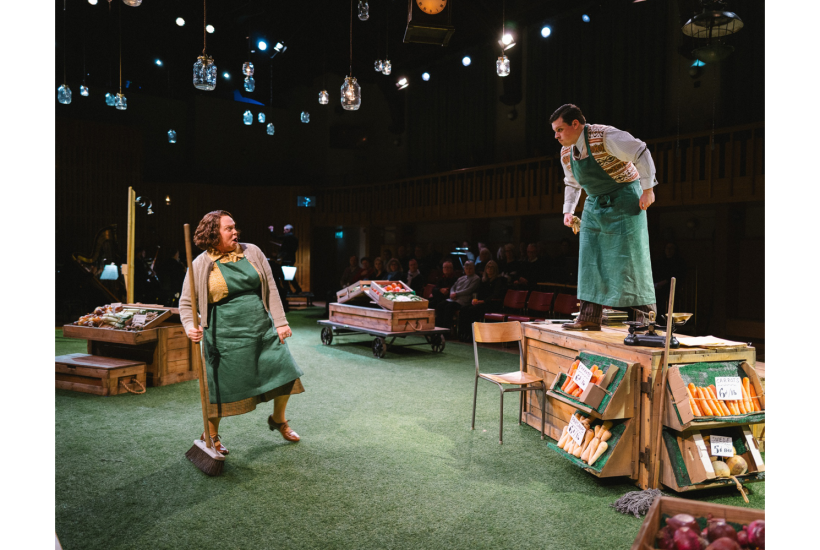Opera North has launched its spring season with Giles Havergal’s 2013 production of Benjamin Britten’s Albert Herring, performed (as conceived) in the Howard Assembly Room – the company’s studio space next door to the Grand Theatre. The economics of opera are a dark and dismal science, but one of the few constants is that ticket sales are never the whole story. So if ON has revived a show that can only accommodate an audience of around 300, and which can’t tour, we should assume that’s all priced in. The problem here is that Havergal presents the opera in the round, a practice rarely seen on the unsubsidised stage but beloved by directors who don’t have to worry too much about the paying public.
Crozier’s libretto is one of the best that Britten had: it’d be good to be able to hear it
With seating on three sides of the performance space, the result, as always, is that there are stretches where at least some of the audience can’t see the performers’ faces, or hear what they’re saying. The problem is made worse by operatic vibrato and a lack of surtitles – a real pity when you’ve got an artist as fine as Judith Howarth playing Lady Billows; a character who’s been described as the Lady Bracknell of opera. The ripe, upholstered grandeur of Howarth’s tone is as splendid as ever but the actual words are often a blur, and it’s not her fault. Eric Crozier’s libretto is one of the best that Britten ever had: it’d be good to hear rather more of it. If you can get past the acoustic issues, this staging is fun – in fact, thanks to revival director Elaine Tyler-Hall, it positively pings along. The venue is completely carpeted with greengrocers’ grass (Albert is the village greengrocer, after all) and the cast bustle in and out while the village brats pop up in the balcony to chant their taunts. Havergal’s production places the action in the opera’s own period, 1947, with woollen pullovers and gingham blouses. Presented like this, it’s tempting to see Albert Herring – whose henpecked hero snaps the apron strings, gets bladdered and finally dares to eat a peach – as a satire on the centrally planned priggishness of Clement Attlee’s Britain. But in truth, it’s too good-natured for that. If it wasn’t for Britten’s bracing, teeming score, it would feel as cosy as an Ealing comedy, or the Archers omnibus.
Opera North’s music director Garry Walker was indisposed, so David Cowan conducted and it all came up as fresh as an April shower, with lairy orchestral wolf-whistles and woozy psychedelic harmonies as Albert’s spiked lemonade goes to his head. There was never any question of the orchestra overpowering the singers, who seemed to have fallen entirely in love with their roles and were doing their best to articulate clearly, despite everything.
Alongside Howarth, Richard Mosley-Evans made a suitably warm and sonorous village bobby, while the sweethearts Sid (Dominic Sedgwick) and Nancy (Katie Bray) were lively, engaging and – in the opera’s brief moment of shadow, after Albert goes missing – heartfelt. And Dafydd Jones was an Albert anyone could root for: projecting flustered, wide-eyed decency and letting his tenor ring firm and clear as he finally asserts himself. If directors are going to persist in doing opera in the round, it needs to be done at least as well as this.
Opera della Luna, meanwhile, is touring Jeff Clarke’s production of HMS Pinafore, which has been around since the millennium and has apparently clocked up more than 500 performances (for context, Jonathan Miller’s English National Opera Mikado, which dates from 1986, is still only in the 200s). I’ve usually seen this light-footed company up close in the rackety (if atmospheric) surroundings of Wilton’s Music Hall. How would they scale-up to the proscenium stage of the Oxford Playhouse? Answer: they took the challenge and ran with it. Apart from the small onstage band, the space is bare. Then, as the overture plays, the crew of the Pinafore use bits of rope and cloth to rig the ship before our eyes: simple but effective theatrical magic.
If directors are going to persist in doing opera in the round, it needs to be done as well as this
Clarke’s staging keeps the original Victorian setting, and also emulates Gilbert and Sullivan’s practice (derived from music hall) of casting a mixture of classically trained singers and comic actors, with a bit of cross-dressing thrown in as required. They all look the part, they bounce cheerfully off each other and, although some sequences (including the finale) have been cut or rewritten for the reduced forces, you never feel (as with the recent ENO Pinafore) that the opera is being patronised. It’s Gilbert’s humour that we’re getting, and all the saltier in this concentrated form.
Three cheers, then, and one cheer more for Matthew Siveter (a ramrod Captain Corcoran), Georgina Stalbow (bright as a bell as Josephine) and as Sir Joseph Porter, the unsinkable Paul Featherstone, whose face even looks like a Cruikshank cartoon. Seriously, you have to see it.
Got something to add? Join the discussion and comment below.
Get 10 issues for just $10
Subscribe to The Spectator Australia today for the next 10 magazine issues, plus full online access, for just $10.
You might disagree with half of it, but you’ll enjoy reading all of it. Try your first month for free, then just $2 a week for the remainder of your first year.








Comments
Don't miss out
Join the conversation with other Spectator Australia readers. Subscribe to leave a comment.
SUBSCRIBEAlready a subscriber? Log in